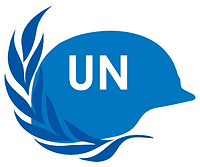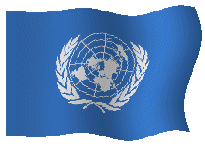

EPACHA.org

Environmental Protection Alliance and Center for Humanitarian Affairs Foundation
"REBUILDING OUR WORLD BLOCK-BY-BLOCK"
T h e P o r t a l s o f E P A C H A F o u n d a t i o n – P h a s e I I a r e O p e n :






2025: The "Journey for Peace"

Enters its
Year of Peacekeeping!
The "Work for Peace" Continues.
77 Years of
UN PEACEKEEPING:
Peace Begins With Me!
1948 - 2025
United Nations Peacekeeping began in 1948
when the Security Council authorized the deployment
of military observers to the Middle East. The role of
the UN Truce Supervision Organization (UNTSO)
was to monitor the Armistice Agreement
between Israel and its Arab neighbours. Since then,
more than 2 million uniformed and civilian personnel
have served in 71 peacekeeping operations around
the world, contributing to the cause of international
security, peace and progress for all peoples.
Text Courtesy, United Nations
UN PEACEKEEPING:
Through the Years
A Journey of
PEACE
For the World!
Major Crute, of Australia serving with United Nations Truce Supervision Organization [UNTSO] as a UN Military Observer.
Courtesy, United Nations - (UN Photo/JG)
Click on Images to Learn More!
Major Lohaec of the French Army, a field observer with UNTSO, conferring with a group of Lebanese officers, on the Arab front at Al Malakiya in 1948
Courtesy, United Nations - (UN Photo/LM)
Canadian UNFICYP soldiers on patrol in Kyrenia, Cyprus, 1964
Courtesy, United Nations - (UN Photo/BZ)
A UNFICYP peacekeeper escorts an elderly Greek woman across the
bridge in Ayios Theodoros, Cyprus, April 1964.
Courtesy, United Nations - (UN Photo/BZ)
India has a long tradition of sending women on UN peacekeeping
missions.
Courtesy, United Nations - (UN Photo/PNS)
From the early days of UN peacekeeping to today’s multidimensional peace operations, Ethiopia has played an important role in the Organization’s
efforts to advance world peace.
Courtesy, United Nations - (UN Photo/J)
Ireland remains one of the longest-serving
peacekeeping nations in the world. Here, members of an Irish battalion leave for UN service in the Republic of
the Congo, July 1960.
Courtesy, United Nations - (UN Photo)
UN PEACEKEEPING:
Through the Years
In Vivid Color!



Courtesy, United Nations / UNTSO - https://untso.unmissions.org/gallery-70-years-untso-anniversary



Courtesy, United Nations / UNTSO - https://untso.unmissions.org/gallery-hom-and-cos-untso-collaboration-visit-berlin
Collaboration with Force Commander UNDOF Lieutenant General Ishwar Hamal, Berlin, April 2022



More than two million men and women have served under the UN flag since 1948.
UN Peacekeepers can be military, police and civilians. Tragically, more than 3,500 have
lost their lives in the cause of peace.
Courtesy, United Nations - https://peacekeeping.un.org/en/our-peacekeepers



Courtesy, United Nations - https://www.crisisgroup.org/global/priorities-uns-new-agenda-peace
Although Global . . .
Courtesy, United Nations - https://www.crisisgroup.org/global/priorities-uns-new-agenda-peace
"Peacekeeping"
Courtesy, United Nations - https://www.voanews.com/a/americas_un-peacekeeping-losing-its-appeal/6208545.html
has not achieved
perfection,
Courtesy, United Nations - https://www.crisisgroup.org/global/priorities-uns-new-agenda-peace
UN Peacekeeping Missions
have been - and continue to be -
a force for
"PEACE"
in a yet turbulent world.
Courtesy, United Nations - https://ourworld.unu.edu/en/an-argument-for-more-focused-un-peacekeeping-mandates
Focusing on "Peacekeeping"
NOW,
Courtesy, United Nations - https://www.iar-gwu.org/blog/2020/03/04/the-mental-health-of-united-nations-peacekeepers-deserves-more-attention
and for future generations to come.





EPACHA Foundation
Thanks UN Peacekeepers
Around the World
International Day of UN Peacekeepers - May 29

C o u r t e s y







2025



Thanking UN Peacekeepers for
Contributing to the Service of Humanity
Around the World!
PEACE BEGINS WITH ALL OF US.
WE CANNOT DO IT ALONE!
MUST SEE VIDEO:
Video Courtesy, United Nations
UN Secretary-General
2025 Message

Courtesy, United Nations
With unwavering courage, United Nations peacekeepers step into danger – to help protect those who need protection, preserve peace, and restore hope in some of the world’s most challenging contexts.
Today, we honour their service.
We draw inspiration from their resilience, dedication and courage.
And we remember all the brave women and men who made the ultimate sacrifice for peace.
More than 4,400 peacekeepers have died in service – 57 last year alone.
We will never forget them – and we will carry their work forward.
The focus of this year’s International Day of Peacekeepers is on “the future of peacekeeping”.
Today, peacekeepers face increasingly complex situations in an increasingly complex world:
Growing polarization and division around the globe …
Operations made even more dangerous from a multiplicity of threats such as terrorism…
Targeting of peacekeepers through deadly misinformation…
And challenges that transcend borders – from the climate crisis to transnational crime.
As we look ahead, it is essential that peacekeepers have what they need to do their jobs.
This is the shared responsibility of the United Nations and Member States.
The Pact for the Future – adopted last year at the United Nations – includes a commitment to adapt peacekeeping to our changing world.
This challenge is also an opportunity:
To analyse what makes peacekeeping operations successful…
To better understand what hinders them…
And to help design new future-focused models that are anchored in political solutions, adequately resourced, and have mandates that are achievable, with clear exit strategies.
The first step – reviewing our peace operations – is underway.
And together, we will keep pushing this vital effort forward.
Now more than ever, the world needs the United Nations -- and the United Nations needs peacekeeping that is fully equipped for today’s realities and tomorrow’s challenges.
Text Courtesy, UN Secretary-General, António Guterres
REMEMBER . . . LIKE WAR, PEACE
MUST BE WAGED!

Learn more on the following web page:





INTERNATIONAL DAY OF UN PEACEKEEPERS - 77 Years
1948 - 2025
UN Secretary-General
"United Nations peacekeepers are the beating heart of our commitment to a more peaceful world.
For 77 years, they have supported people and communities rocked
by conflict and upheaval across the globe."



THE WORLD'S TRUE SUPER
STARS ARE . . .
THE PEACEKEEPERS.
SINCEREST THANKS
FOR 77 YEARS OF
GLOBAL PEACEKEEPING.
Quote / Image Courtesy, United Nations - Secretary-General António Guterres
Read full Message on the following web page:
75th Anniversary
THEME:
"Peace Begins With Me!"
Courtesy, United Nations
United Nations peacekeepers are the beating heart of our commitment to a more peaceful world. For 75 years, they have supported people and communities rocked by conflict and upheaval across the globe.
Today, on the International Day of United Nations Peacekeepers, we honour their extraordinary contributions to international peace and security.
Since 1948, more than two million peacekeepers have served in 71 missions, helping countries navigate the difficult path from war to peace.
They are also critical to the protection of civilians caught up in the chaos of these deadly conflicts, providing a lifeline of hope and help in some of the most dangerous contexts imaginable.
In carrying out this essential work, many peacekeepers have paid the ultimate price. More than 4,200 peacekeepers have lost their lives serving under the UN flag. We stand in sympathy and solidarity with their families, friends and colleagues, and will forever be inspired by their selfless devotion to the cause of peace.
Today, more than 87,000 peacekeepers from 125 countries serve in 12 operations. They face rising global tensions and divides, stagnating peace processes, and more complex conflicts.
Despite these obstacles, and working with a wide range of partners, peacekeepers persevere.
To people living under the shadow of conflict, our teams of Blue Helmets represent hope.
As peacekeepers support humanity, let us always support and recognize them.
Text Courtesy, UN Secretary-General António Guterres
Learn more on the following web pages:



-
Keeping Peace for the World!

Courtesy, United Nations
In addition to keeping the peace, their missions include an extensive
array of humanitarian assistance that involves a tremendous
amount of hands-on duties and responsibilities
that many do not realize.

Courtesy, United Nations
UN Peacekeepers themselves have families - children and
loved ones - who also experience a sense of loneliness
when they are deployed and great happiness
upon their return home to family and friends.

Courtesy, United Nations
UN Peacekeepers
Also Make the Ultimate Sacrifice!
Honoring Heroes of Peace - United Nations
Fallen Peacekeepers

Courtesy, https://unifil.unmissions.org/peacekeepers%E2%80%99-day-unifil-pays-tribute-military-and-civilian-personnel
R E M E M B E R
Like War . . .
PEACE Must be Waged!

Courtesy, United Nations
-





L e a r n m o r e a b o u t
United Nations Peacekeeping

Courtesy, United Nations
Thank a UN Peacekeeper
for helping to bring
“ P E A C E ”
to the World!
-
Many Thanks!
-





-
If you’ve missed the work of EPACHA in its Phase I duration, please be encouraged to click on the below web links.
Sincerest Thanks are Extended to http://archive.org/web/ for having made possible an archived viewing of
EPACHA Foundation’s entire volume of its Phase I web pages:

https://web.archive.org/web/20180321225044/http://www.epacha.org/Pages/Home_Page_BkUp3.aspx
Complete List of EPACHA - Phase I web pages:
M A Y 2 0 1 8 - U P D A T E D - J U L Y 2 0 2 5





















